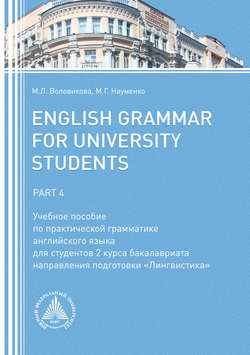Читать книгу English Grammar for University Students. Part 4 - Марина Воловикова, М. Г. Науменко - Страница 3
Module 1. The infinitive
The grammatical categories of the infinitive
ОглавлениеThe Infinitive possesses verbal categories: temporal correlation, aspect, and voice (for transitive forms) (as shown in the table below) [Тивьяева, 2007].
FORMS OF THE INFINITIVE
As for temporal correlation, the forms of the Infinitive show whether the action is simultaneous to the action expressed by the finite verb, or prior to it.
1. The Non-Perfect (Indefinite, Simple) Infinitive denotes an action simultaneous with that of the finite verb.
Jeremy likes to write letters.
Jeremy liked to write letters.
Jeremy will like to write letters.
2. The Continuous Infinitive expresses an action in progress or happening over a period of time and simultaneous with that of the finite verb. The Continuous Infinitive is both a temporal and aspect form, becauseit expresses how an action, denoted by the Infinitive, extends over time.
You must be joking.
I happened to be waiting for the bus when the accident happened.
3. The Perfect Infinitive denotes an action prior to that of the finite verb.
Lucy was known to have left the day before.
I am happy to have finished school.
If you had run faster you would have won the race.
4. The Perfect Continuous Infinitive denotes an action in progress or happening over a period of time which is prior to that of the finite verb. The Perfect Continuous Infinitive is both a temporal and aspect form,because it expresses how an action, denoted by the Infinitive, extends over time.
I’m glad to have been living in Barcelona for the last ten years.
But for the fog the travellers would have been wandering in the forest for a long time.
The Infinitive of transitive verbs possesses voice distinctions and has the forms of the Active and Passive Voice.
Please remember to bring a mat and a towel with you to the next aerobics class (Indefinite Active).
He happened to be brought up in a very rich family (Indefinite Passive). President Trump is very proud to have brought the subject of illegal immigration back into the discussion (Perfect Active).
Tomatoes are known to have been brought to Europe in the XVIth century (Perfect Passive).
The active form of the Infinitive shows that the subject of the sentence, the person or thing characterised by the Infinitive, or the person or thing expressed in the Infinitive predicative construction is the doer of the action denoted by the Infinitive.
The passive form of the Infinitive shows that the subject of the sentence, the person or thing characterized by the Infinitive, or the person or thing expressed in the Infinitive predicative construction is affected by the action denoted by the Infinitive [Шрамко, Степанова, Кожемяка, 2008].
